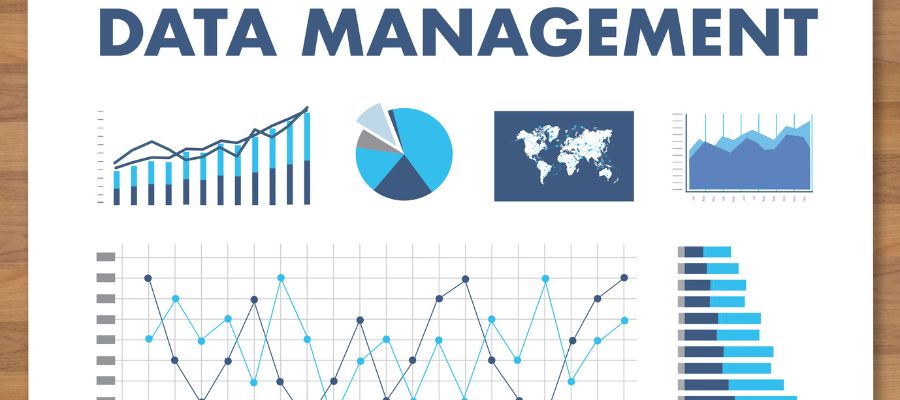The Ultimate Guide to Effective Data Management for Businesses
- Get link
- X
- Other Apps

The discipline of statistics has so truly become essential to teams in the modern virtual generation. Having appropriate control over information is essential for everything from strategic management to consumer behaviour. This guide will walk you through all you want to know about managing statistics efficiently, guaranteeing your enterprise is capable of getting an excellent feasible fee from its statistics.
Information is the bedrock of today’s global world which is inundated with records, which makes data management more important than ever before. Facts are being accumulated in large volumes on a daily basis irrespective of the type and sise of the companies and the industry they belong to.
However, to be able to convert this statistics into practically useful decisions that will help the management of the enterprise grow, an established way of handling records is essential. This guide introduces you to Facts Control: what it is, the benefits of using Facts Control and best practice to adopt in your organisation.
What is Data Management?

Data management can be explained as the capturing, recording, cataloguing, storing, processing archiving and disseminating of data in a technique to enhance its usability. It covers a broad spectrum of activities and possessions aimed at guaranteeing data’s reliability, accessibility, and protection. Effective data management involves several key activities:Effective data management involves several key activities:
1. Data Collection: Collecting information from strata.
2. Data Storage: Securing data while at the same time ensuring it is easily retrievable.
3. Data Organisation: Organising data in such a fashion that a user can easily locate and put the data to immediate usage.
4. Data Analysis: Processing data into information and knowledge in order to make analysis, forecast or improve understanding about a specific situation, event or phenomenon.
Concisely, Data management is also the procedure of handling the actual data to fit organisational objectives and strategies.
Benefits of Data Management

The management of data offers several advantages to firms. Here are some key advantages:Here are some key advantages:
1. Improved Decision-Making
It also allows for accuracy in analysis of data and efficient arrangement, thus providing better results when making decisions. By using analysis, organisations are able to make better decisions that benefit the companies rather than risking the outcome based on inspiration.
2. Increased Efficiency
Managing data reduces the time taken in data activities since the data processes are organised such that there is no wastage of time.
3. Enhanced Data Security
In broader terms, organisations must ensure they have strong protection policies and procedures when it comes to storing data in order to defend it from malicious attacks and hacking attempts.
4. Regulatory Compliance
Management of data aids in adherence to the legal and the regulations negating instances of penalties and cases tricky.
5. Customer Satisfaction
Hence, proper handling of customer data can improve the level of satisfaction that a given business institution provides to its customers.
6. Cost Savings
If data is well managed then the costs of storing and managing data are likely to be minimised; thus passing a big saving.
Types of Data Management

Data management encompasses various types, each addressing different aspects of data handling. Here are some common types:
1. Master Data Management (MDM)
Emphasises the generation of a unified and correct perception of critical business information within various systems and organisation units. MDM fosters sanity in the core data of business operations.
2. Enterprise Data Management (EDM)
It involves coordinating the data throughout the organisation and aligning the data from various sources to help the processes and decisions.
3. Product Data Management (PDM)
Oversees information covering products right from the time they are in the drawing board, to development and selling. Originally, PDM helps to guarantee that all product data being used is correct and current.
4. Clinical Data Management
Focused on Clinical Data Management and knowledge of clinical trials and research hence having ability to manage the clinical data properly with complete accuracy, data security and the adherence to regulatory standards.
5. Cloud Data Management
Concerns data that is stored in cloud environments including flexibility and scalability for the organisation and handling of issues such as security as well as data integration.
Data Management Challenges

While data management offers significant benefits, it also comes with its share of challenges:
1. Data Security
Security, especially against advanced threats like hacking and loss of sensitive data are a significant issue. Security is therefore an important aspect that should not be neglected in an organisation’s business operations since information is vulnerable to threats should it fall in the wrong hands.
2. Data Quality
One has to be very careful with the kind of data s/he is analysing, and s/he has to pay extra attention to the accuracy of data collected as well as integrity of the data. Inaccurate data generally means that decision makers are getting the wrong information and therefore making wrong decisions.
3. Data Integration
It can be cumbersome when consolidating data because data may come in different formats and may be stored in multiple systems.
4. Data Volume
This overwhelm is due to the fact that there is a flood of information in the modern world. Storing and processing big data need the use of proper storage platforms as well as right ways of processing the data.
5. Regulatory Compliance
It is difficult to meet data protection regulations and standards as the legal requirements change, and their stringency increases.
6. Cost
The use of data management systems and tools entails great expenses when it comes to implementation as well as in the future. Such a system is valuable for businesses that require an optimisation of data management expenses in relation to their general budget constraints.
Data Management Best Practices

To overcome these challenges and optimise data management, businesses should follow these best practices:
1. Invest in Data Management Tools: It is also important to use mechanisms of data management, data management tools and data management software to increase the productivity when dealing with data.
2. Ensure Data Quality: It is also recommended to perform data auditing and cleansing exercises often to keep the data proper and unified.
3. Implement Data Security Measures: Employ encryption; access control and any other security measures that inhibit danger data leakage or unauthorised access.
4. Facilitate Data Integration: Employ data management platforms as it helps in integrating disparate data sources and systems effortlessly.
5. Promote Data Governance: Develop data management policies that will assist in maintaining sound policies to enhance compliance with the set regulations.
6. Train Employees: Brief your team on proper management of data as well as the need to ensure that data quality and its security is a priority.
7. Leverage Cloud Solutions: Research on necessary improvements in the use of the cloud for data storage to increase flexibility, scalability and relate to costs.
Data Management Software

Choosing the right data management software is crucial for effective data management. Here are some popular types of software to consider:
1. Data Management Platforms (DMPs): Common platforms on such platforms gather data from other sources for advertising and as a reference to make decisions.
2. Data Warehouses: Large databases that are used to store and collect massive amounts of data used in business intelligence and reporting.
3. Database Management Systems (DBMS): Programs used in dealing with data managing processes and its organising in a database and to support its storage and retrieval functionalities.
4. Cloud Data Management Solutions: Many provide highly flexible and may involve scale, and may also come with integrated data protection services.
5. Data Integration Tools: Ensure interoperability of data linkage to provide consolidated information to the management.
6. Data Governance Tools: Assist in providing oversight in the data governance policies and compliance to set legal requirements.
How to Be Part of the Evolving Data Management Scene

As data management continues to evolve, staying updated with the latest trends and technologies is essential. Here’s how you can stay ahead:
1. Adopt Emerging Technologies: Discuss the current trends in management of big data including AI and machine learning to analyse data as well as automate the process.
2. Participate in Industry Forums: Consult business intelligence services & forums to keep up with the existing trends, & industry standards.
3. Continuous Learning: Focus on training and certification services concerning data handling both for general and IT project management consulting services.
4. Collaborate with Experts: Source software consulting services and application maintenance and support providers in order to better implement your data management strategies.
5. Stay Compliant: To eliminate the siren call of outdated plans, ensure that you stay informed about the changes in the regulatory mechanisms concerning the data management strategy.
Conclusion
Good data management is very important especially for any organisation that intends to use data to unlock future opportunities. Knowing what data management is, gaining awareness of its advantages, and applying proper recommendations will help you take care of your data quality. Therefore, choosing the proper tools for data management and sorting out the trends in the field will assist in functioning in this sphere and utilising and developing data to the utmost extent.
All in all, the targeted data management best practices not only facilitate better decision-making and organisation functioning but are also beneficial when it comes to data protection and compliance. While you decide on which way to go on data management remember that education is important and embracing new technologies will keep you relevant especially in the growing field of data management.
Source: Data Management
- Get link
- X
- Other Apps
Comments
Post a Comment